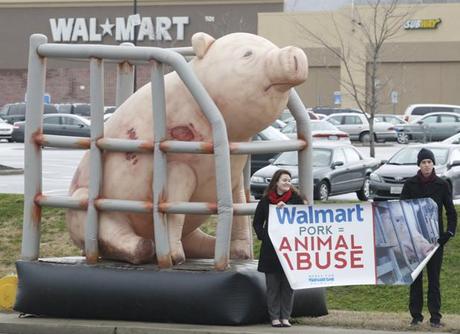 Photo by Doug Strickland.
Photo by Doug Strickland.
Cross Posted from timesfreepress.com
By Shelly Bradbury
For the last four weeks, Phil Letten has been road-tripping through the U.S. in a gray Toyota Corolla, donning a suit and tie each day and inflating a 10-foot-tall caged pig at Walmarts in cities from California to New York.Monday, he was in Huntsville, Ala. Tuesday he stopped in Chattanooga, and today he’s in Nashville. He’s a national campaign coordinator for Mercy For Animals, a nonprofit group that claims Walmart’s pork suppliers abuse pregnant pigs by keeping them in small cages that prevent them from lying down comfortably, turning around or engaging in natural behaviors.
“The hidden cost of Walmart’s cheap pork is egregious animal abuse,” Letten said, standing in a cold drizzle Tuesday in a Walmart parking lot at 501 Signal Mountain Blvd.
Chattanooga was stop 89 of the 117-city national tour. Letten spent three months on the road last fall, took a break, and re-started the tour again last month.
“I’m opposed to animal abuse, and when I saw that pregnant pigs had to endure this, I wanted to get involved,” he said.
The meat and poultry industry contributed about $832 billion to the U.S. economy in 2009, according to the American Meat Institute, and provided around 6.2 million jobs.
Whether or not farms should use gestation crates — which are typically made of metal tubing and are designed to fit one sow — is not a new debate. The crates allow farmers to house more pigs, protect sows and piglets, individually control feeding and reduce labor costs, according to the U.S. Department of Agriculture.
But the gestation stalls also limit each pig’s movement, can create health problems like weaker bones and are usually in an enclosed, climate-controlled building with no bedding.
Nine states have banned the use of gestation crates, including Arizona, Ohio and Michigan. Some retailers, including McDonald’s, Wendy’s, Kroger and Costo, have agreed not to use gestation crates.
Walmart spokesperson Danit Marquardt said the issue is not simple.
“This is a complicated issue and there are different points of view,” she said. “We hold our suppliers to the highest standards and do not tolerate animal mistreatment.”
The American Farm Bureau Federation does not find that the gestation stalls harm pigs’ welfare, said Dale Moore, executive director for public policy.
“For the producers to provide the quality and quantity of pork the market is demanding, they’ve got to be productive and they’ve got to do so in an affordable way,” he said. “This is one of those proven methods. If a sow is not in an environment where she feels healthy and safe and comfortable, then our producers are giong to suffer economically. We need the mother to be in good stead.”
Four people showed up to the hour-long protest in Chattanooga on Tuesday. A few drivers honked as they passed by, and about halfway through the protest, rain started to pour down. Lindsey Frost Cleary, who works at UTC, held a poster on the curb during the protest.
“Pigs are so smart and so intelligent,” she said. “The more I read about it, the more obvious it was that it needs to change.”
But making the change from gestation crates to alternative housing like group pens could be costly for the pork industry. A 2010 study from the University of Minnesota estimated the switch would cost between $1.87 billion and $3.24 billion. And the faster the industry makes the transition, the more it will cost.
The switch away from gestation pens would also drive up pork prices, the study found.
“An argument is typically made that increased animal welfare is demanded by consumers and they will compensate producers by paying higher prices,” study author and professor of applied economics Brian Buhr wrote. “However, as clearly shown, the market alone will not compensate producers. To fully compensate pork producers would require an additional 25 percent increase in consumer willingness to pay for U.S. pork products from sows raised in pens.”
Still, over 75,000 people have signed Mercy For Animals’ petition on change.org that asks Walmart to phase out gestation crates. The group is targeting Walmart because the company is a leading retailer with the power to change the supply chain, Letten said. He’s got 22 more stops in his national tour.
“But,” he said, “we’ll cut the tour short if Walmart does the right thing.”

